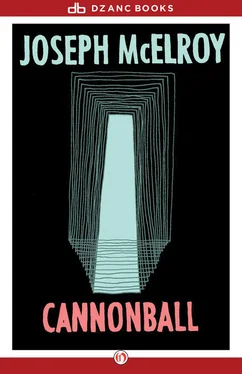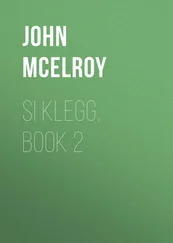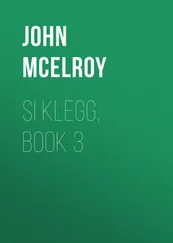Joseph McElroy - Cannonball
Здесь есть возможность читать онлайн «Joseph McElroy - Cannonball» весь текст электронной книги совершенно бесплатно (целиком полную версию без сокращений). В некоторых случаях можно слушать аудио, скачать через торрент в формате fb2 и присутствует краткое содержание. Год выпуска: 2013, Издательство: Dzanc Books, Жанр: Современная проза, на английском языке. Описание произведения, (предисловие) а так же отзывы посетителей доступны на портале библиотеки ЛибКат.
- Название:Cannonball
- Автор:
- Издательство:Dzanc Books
- Жанр:
- Год:2013
- ISBN:нет данных
- Рейтинг книги:5 / 5. Голосов: 1
-
Избранное:Добавить в избранное
- Отзывы:
-
Ваша оценка:
- 100
- 1
- 2
- 3
- 4
- 5
Cannonball: краткое содержание, описание и аннотация
Предлагаем к чтению аннотацию, описание, краткое содержание или предисловие (зависит от того, что написал сам автор книги «Cannonball»). Если вы не нашли необходимую информацию о книге — напишите в комментариях, мы постараемся отыскать её.
continues in McElroy's tradition of intricately woven story lines and extreme care regarding the placement of each and every word. A novel where the sentences matter as much as the overall story.
Cannonball — читать онлайн бесплатно полную книгу (весь текст) целиком
Ниже представлен текст книги, разбитый по страницам. Система сохранения места последней прочитанной страницы, позволяет с удобством читать онлайн бесплатно книгу «Cannonball», без необходимости каждый раз заново искать на чём Вы остановились. Поставьте закладку, и сможете в любой момент перейти на страницу, на которой закончили чтение.
Интервал:
Закладка:
A “weapon” it had been called in government circles you heard in the beginning — why tell me? — and later in an improvised Administration news conference said to be in motion hooked up to a conference call.
A miracle that wound up where it was heading, my dad actually said to a son known for saying blunt stupid things or embracing untenable positions or posing questions.
Mysterious, I accept him, managing somehow to excuse himself outlandishly from the Reserve without ever undermining our morale by letting us in on it though how I got my job is also an interesting question I asked myself at his birthday dinner before I left. Though felt one chance already gone replaced by another coming.
How to find the right person even more than question to ask proved my training no less than hearing for myself and knowing a few people before they vanished, a chaplain at Fort Meade, a sergeant behind the wheel of a car in foreign streets. An office, a captain.
An ochre city not at peace or war outside the window, a parking lot it was well to keep an eye on from time to time, this captain paging gingerly through dozens of prints of what I did best, careful not to touch more than a corner lest some damp contagion reach the thumb and fingertips of his left hand. A captain who traded words with you as if he had some hunch. That the work — the photos, the work now strewn across a desk — claimed some privilege quite other than a camera’s light. That my sister once after some months when I had scarcely heard for all her attention to me had wanted to know what had been said just before a certain shot was taken — something said in words — wound my slack tighter too.
My father would have liked three white-pyjama’d suspects framed by the open back of a dedicated personnel carrier so they seemed to be on a tilted TV screen. Two Yamaha wheelies spinning off a ramp, I could just hear them, one biker blindfolded. “Jump pay,” I said. Two headless kids caught squatting still upright beside an irrigation ditch at Tal Afar. (Non-renewable resources, I muttered.) A one-legged Indirect Fire Specialist with big tits going in for a lay-up hopping as she bounces the basketball, which is also caught in the air (“Woman MOS,” I said; captain, “No such thing.”) Two left severed ears on the shelf of a bookcase. A Dang Freres ice cream Humvee unloading the day after their Defense contract got canceled when they were discovered to be a French Catholic firm. Seen from the window of an armored vehicle returning for the fourth time I was told to the same village, indigenous trainees fieldhockeying a ball around with their Kalashnikovs on a leveled playing field. An old man in a green beret watching fire skating across a river.
“Famous at HQ,” said my captain, and telling me that his former North African wife had complained that all this was much more like her part of the world, that particular wartime than all the other wars they were comparing this to. In his look something asking for words looked at the open window and turned to look up at me from what I suddenly understood were these unwanted pieces of something or other, weird as the camera itself, though not more surprising than the war. “You have a fan here, from a Reserve brigade, Wisconsin, likes your approach.” He looked at the open window. Music ongoing but “Stairway to Heaven,” a light in the voice straining to stay alive in the guitars and bass I hadn’t heard before.
I could have shared this with the captain and the only hearsay-news news that Umo had a job with a low-budget guy documenting music mostly Metal that American GIs were into over here, but I knew no more than that the cop had told The Inventor who told Milt who told my sister whom he lusted after. You can be psychically connected to a person like this captain even with almost nothing in common. He answered a phone. I heard him say, “They want heads on a plate.”
Hanging up, he said, “You’ve got some radar.” Well you had to shoot quick, I said. Right, he said; that kid with his mouth open. See three things at once, have faith in your eye, I said, plotting where I was standing, hoping for I didn’t know what. Kut again. Shoulda seen what was going on on the floor. (My sister had needed to know what happened just before this shot — her trademark question. What trade am I putting her in?)
“Those do-rag graybeards arm-wrestling…” said captain.
“Kut; down at—” I started to tell the captain what he thought he knew already. “—Triple Canopy guy—” he said. (Two guys with a bit of someone under the table, then one reaching for my camera.)
“—Kut,” I finished; “well, the security outfit — but he’s got the Special Forces patch — and the other one was a friend of my dad’s, a total coincidence.” “We know him,” the captain said; “Reservist.” “That’s correct, a powerlifter, a salesman — shoulda seen what was going on on the floor,” I said, the photographed, the unphotographed; but what had captain revealed? “Piece work, you get used to,” said the captain. “Who’s we?” I said. “I liked the crane hoisting the billboard into place,” he said, the way people say they liked something and don’t say why.
“Advertising—”
“—honey?”
“Saudi honey,” I said. The captain grinned. (One of three billboard shots where I tried to catch that noose-hole of opportunity, the Occupation said to be over but the privatizers’ “laboratory” with several months to go till we had our Constitution, I told my sister and would tell the Competition Hearings.)
“You enlisted…,” the captain said curiously. An agreement, I said, but to do what? I asked myself again out loud, always somehow knowing it was in my gentleman’s agreement it came to me with Umo. “Let’s have some more tank-and-flag shots,” my captain said, and wondering exactly what he meant I told him for months I had wondered how much friendly fire I survived. Going where I was told, you know. Was I prepared or being?
Onward — like targeting what I couldn’t put my finger on. Days, weeks late my sister had e-mailed love and a misspelling and so glad and sorry of my new friend at Specialist school who had vanished into a building one day we were jogging on the Base but wasn’t their a door left ajar? No, he had appeared to be untraceable, I’d replied, though I gave up at first. Older, a Chaplain training for combat photography who, to his peril, might know more than his calling. Underwater photography he had thought he was headed for but they had other plans. “Maybe he went on a retreat,” my sister thought, maybe because I was at Fort Meade for those few weeks and she recalled that “retreat” was how Dad termed his eight civilian days spent there, when I had mentioned to her this chaplain at Meade who thanked me for a thought that I personally thought had been his, about finding your real job in another one you’d been pushed into. My sister who even if what she sees isn’t yet sees much — that our father once called too much nothing.
I dug up the present.
“Sympathy for the Devil” banging out of someone’s CD near the window, I felt my captain wanted me to speak. That field of cukes and tomatoes in the photo could be anywhere. And landlocked green winter wheat along a seam of a river, the Mesopotamian plain nice but kinda flat for a photo, I said, the checkpoint bridge just outside the frame, two guys lying on the ground I couldn’t take. Right, said captain, you’ve a fan right here in the office, Specialist from Wisconsin. Right, I said, let the chips—” “Something else for you now.” “—fall…”—we nodded, where they may unsaid. “You’ve got to face the music,” the captain said, as if I did have to. “Your father now. He was in Vietnam. Or…?” “No. His friend…” I began.
Читать дальшеИнтервал:
Закладка:
Похожие книги на «Cannonball»
Представляем Вашему вниманию похожие книги на «Cannonball» списком для выбора. Мы отобрали схожую по названию и смыслу литературу в надежде предоставить читателям больше вариантов отыскать новые, интересные, ещё непрочитанные произведения.
Обсуждение, отзывы о книге «Cannonball» и просто собственные мнения читателей. Оставьте ваши комментарии, напишите, что Вы думаете о произведении, его смысле или главных героях. Укажите что конкретно понравилось, а что нет, и почему Вы так считаете.












